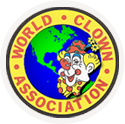The scientific word for the fear of clowns is “coulrophobia” and it is a real phobia or mental disorder. The “why” can be a great variety of things as there are many reasons possible, but first we should try to discern if the person is displaying a real fear or phobia or is it a trendy, teen-age “in-thing” based on seeing a movie such as “It” or “Killer Clowns from Outer Space” and running away or squealing just for effect.
The reasons behind coulrophobia are varied and we must acknowledge that there are some truly scary looking clowns. Traditionally, clowns in the circus years ago applied the white, red and black face paint boldly to be seen at a great distance and it was often scary looking when seen up close. In fact, the word “grotesque” is a name used in old-time circuses for the category of white face makeup design used. In addition, many Halloween and hobby clowns have not learned the proper way to apply makeup and set it with powder so their makeup runs and streaks and quickly looks scary.
Halloween is a bad season for clowns as several theme parks use a horrible scary clown face for advertising their horror shows. Costume shops carry horrible rubber masks of clowns paired with blood and gore. In fact, fear of clowns is closely related to another phobia called “maskaphobia”, the fear of masks. Similar to a mask, clown make-up and accessories may distort the wearer’s appearance. This fear also encompasses the fear that the wearing of makeup and a costume provides anonymity which may change the wearer’s behavior allowing him/her to hide behind the mask, and do negative and harmful things. This is the concept used by those who rob a bank wearing a clown mask but they could never be called real clowns.
Fear may be based in a negative experience with some costumed character (Santa, Easter Bunny, clown) at a young age. Children around the age of 2 are generally overwhelmed with any costumed character and the actions/reactions of the parent or guardian they are with will later play a big part in their perception. A parent may want their young child to have a picture with the clown but may approach the “strange-looking character” too quickly resulting in scaring the child. A young child would show the same fear to any stranger being thrust upon them, even without the makeup and costume. And then the next time that parent has an encounter with a clown, they state that their child is afraid of clowns, resulting in the psychology of the child associating fear and clowns. The experience may have been real or it may be an account related by someone the child trusts and believes.
And then there is the marketing strategy of many other variety artists who think they will add comedy to their act by simply putting on a clown costume and a mask or painting their face. Similarly, just by putting on a doctors coat does not make a person a doctor but many non-trained people think all it takes to be a clown is some silly wardrobe and some improperly-applied makeup and they will be clown magicians or clown balloonists. Lack of specific clown training results in undesirable appearances and behaviors, leaving their public unaware that they are not actual clowns.
Another cause for fear is the hype created by the mass media in movies, TV, or even advertising, portraying evil clowns and causing children and even adults who are not personally exposed to a real clown to be trained to dislike or fear them. Remember that horror shows, scary movies, and other media are looking for a certain kind of reaction. They are looking to scare and they have taken every good career and turned it around to show an evil potential, such as doctors, lawyers, priests, and clowns – but it’s only a movie, written to solicit the fear reaction and getting a great marketing boost resulting in their financial gain – at the clown’s expense.
Recognizing that coulrophobia is real and there are many entities in the world that want to emphasize evil for their own financial gain, the World Clown Association takes a strong stand to develop professional clowns that are well-educated in the proper art of clowning, are the best looking and best skilled entertainers out there, and who are professionally trained to be ambassadors of joy, bringing laughs, spreading cheer, and helping those they meet to see the good in clowns and the positive effect clowns have on people’s lives.
